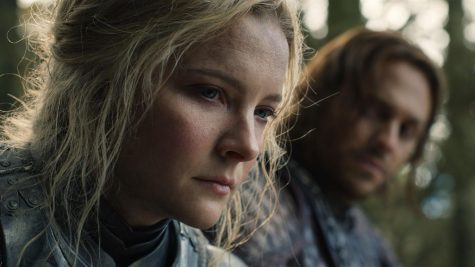Who’s watching?
Evaluating forms of criticism of movies and TV shows
May 18, 2023
An 84-second teaser for Disney’s live-action adaptation of “The Little Mermaid” was released on Sept. 9 and within hours, the hashtag #notmyariel went viral on social media. The tag consisted of people complaining about Disney’s choice to cast Halle Bailey, a Black actress, as Ariel, the titular “Little Mermaid.”
Fans claimed the changes in Ariel’s skin tone from the 1989 “The Little Mermaid” made the remake too “woke.” Some even digitally altered the teaser trailer with a white actress instead of Halle Bailey to express their disapproval of the upcoming movie. Fans used the apparent derivation from the canon to justify their racism. For example, some people complained that casting a Black actress would not allow for Ariel’s iconic red hair, which, as seen in the trailer, remains.
Similar backlash was seen for casting Leah Jeffries as Annabeth Chase in the “Percy Jackson and the Olympians” TV Series on Disney+, saying that Jeffries’ skin color did not match the description of the character in the book. “Percy Jackson and the Olympians” author Rick Riordan has responded to the criticism by clarifying his involvement in the casting process and supporting Leah Thomas as the best fit for the role.
Casting people of color to portray narratives often associated with white characters has been highly politicized, as the movement toward diversity has been associated with policies like affirmative action and diversity quotas in other professional industries. Rising to prominence with Lin Manuel Miranda’s color-conscious casting method for the hit Broadway Musical “Hamilton,” more and more studios adopted the idea of having diverse casts play traditionally white roles. While many original shows with actors of color have become very popular, adaptations of existing media and fantasy shows have come under scrutiny for casting POC actors.
Cries of wokeness often come from existing fanbases, where people have a preconceived notion or source material where characters are often described to look a certain way. This is seen in the initial reactions to casting for “The Little Mermaid” and “Percy Jackson and the Olympians,” but when creators of the original story are in support of a script or casting choice, there is little valid criticism of the faithfulness of an adaptation to the source material.

The absence of this authority can create a vacuum of opinions from those who consume the media, as seen in adaptations of older media, like Amazon Studios’ “The Lord of the Rings: The Rings of Power.” The effort to expand a widely-loved universe and include actors of color faced backlash well before the show was released. In this case, the late author could not provide input on the sale of the rights of his work for “The Rings of Power” nor could he say anything to address the resulting fandom response.
Furthermore, fans complained about the recharacterization of Galadriel, played by Morfydd Clark a main character of the show, which stood in contrast to Peter Jackson’s interpretation of the character in “The Rings of Power.” Although criticizing the poor execution of her character, like her obvious plot armor and lack of character growth, is justifiable, the rampant misogyny conveyed through these criticisms did not take into consideration the role of a character within a story. The audience isn’t necessarily supposed to like the main character — the main character is there to drive the plot in a compelling way. Saying that a character is stagnant and often contradictory is insightful criticism, but saying a female character is bad for having masculine characteristics or interests is not constructive.
There are far greater aspects of a screen adaptation to complain about, such as film quality, rather than the race of a character. “The Rings of Power” is poorly paced and fails to juggle multiple unrelated storylines. From the clips of the movie shown in trailers, “The Little Mermaid” has rather cheap-looking CGI. “Percy Jackson and the Olympians” has a historically bad track record for screen adaptations. The point of diversity, especially in fantasy adaptations, is not to race-bend narratives, but to provide equal representation for characters and actors of color. The casting of Halle Bailey as Ariel, for example, helps dismantle the notion that characters in modern fantasy are by default white.
Valid criticism comes from a holistic evaluation of media — Black dwarves don’t make a show bad, but a poorly-paced script with flat dialogue does. Furthermore, this assessment cannot be done without experiencing the media first. Even if audiences have complaints about a piece of media, ‘race’ and ‘wokeism’ are lazy, surface-level arguments for why it’s unfavorable. As audiences, we need to understand the reasoning behind the decision to include actors of color as a move toward democratizing all genres of film for actors and for the people watching.




























